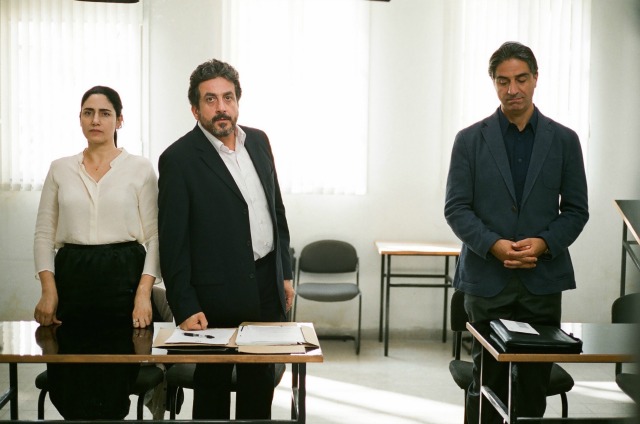'Gett' Paints A Painful Portrait Of Divorce, Israeli Style
By Joel Wicklund in Arts & Entertainment on Feb 27, 2015 5:30PM

Ronit Elkabetz, Menashe Noy and Simon Abkarian in 'Gett: The Trial of Viviane Amsalem.' (Photo courtesy of Music Box Films.)
Whatever one's politics or feelings about the Israeli-Palestinian conflict, most Americans would certainly point to Israel as the prime example of a Middle Eastern democracy sharing most of our treasured societal values. But in its divorce laws for Jewish citizens, Israel is stuck in an infuriatingly patriarchal, near-fundamentalist state, which is depicted with great dramatic power in Gett: The Trial of Viviane Amsalem.
The government grants decisions in those cases to a rabbinical court that rules based on Orthodox Judaism, requiring both husband and wife to consent to the divorce. While the court has some power to force the hand of the uncooperative spouse, its religious traditions tend, not surprisingly, to favor obstinate husbands.
This is the scenario that plays out in increasingly combative, stressful fashion in Gett, as Viviane (co-writer and co-director Ronit Elkabetz) seeks legal separation from her passive-aggressive, controlling husband Elisha (French-Armenian actor Simon Abkarian, who appeared in Casino Royale). Their marriage seems to have been a bad match from the start, but Viviane's demand for a divorce only makes Elisha more vindictive. Despite decades of discontent in their household, his arrogant self-esteem seems dependent on keeping his wife legally tied to him.
The movie's effective use of titles to show the passage of time leads to almost jaw-dropping disbelief for the viewer, as the trial drags on for months and then years, with the judges demonstrating a complete lack of empathy, if not outright disdain, for Viviane. At their best, the judges are ineffective. At their worst, they act punitively toward a woman who, in their view, should not walk away from a "good marriage." Elisha, after all, does not physically abuse her and provides for all her material needs. His cold, quiet malevolence is barely noted by the rabbis in spite of Viviane's evident and overwhelming unhappiness.
Viviane's lawyer (Menashe Noy) is almost as frustrated as his client at the court's biased decisions and snail-paced actions, perhaps because—as the opposing counsel suggests—he is in love with Viviane. Whatever their relationship outside of the courtroom, both find themselves in the impossible position of secular people forced to cater to orthodox rule.
Like many courtroom dramas, Gett could easily be transported from the screen to the stage. All the action takes place in the courthouse and most in the courtroom itself. However, the movie avoids feeling like a filmed play thanks to subtle but effective visual devices. Ronit and her brother and filmmaking partner Shlomi Elkabetz make strong use of the spare, cold environs. Blinds in the windows appear like prison bars in the mostly white rooms and the insurmountable divide between the spouses is shown in shots where lawyers stand between them like a human wall, as they exchange hateful glances or mouthed insults.
The superb acting also keeps the drama cinematic. While there are many outbursts from different parties in the case, nothing seems over the top. The entire cast is excellent, but Elkabetz stands out in the lead. All her emotions are conveyed as if deeply felt, from sheer exhausted defeat to pure rage. In the climactic scenes of the film, she teeters on a total breakdown and you want to join in her desperate pleas to the judges.
For all its potent fury, there is some unexpected humor in the movie. At some point, this backwards approach towards justice becomes completely absurd, and the screenplay lets the characters acknowledge that in sly, fleeting moments.
Gett is actually the third movie to follow the downward spiral of Viviane and Elisha, following 2004's To Take a Wife and 2008's 7 Days, though it functions perfectly as a stand-alone feature. Still, it would be interesting to go back to the earlier films and see if the trilogy is something like a more corrosive equivalent to Richard Linklater's Before Sunrise/Before Sunset/Before Midnight series.
Movies should be viewed first and foremost as works of art, not agents of social change. Still, as the fictional portrayal of Jewish divorce in Israel seems to mirror the reality, you can only hope Gett inspires Israelis to demand their government do the right thing and take this personal matter out of the hands of the church entirely.
Gett: The Trial of Viviane Amsalem. Written and directed by Ronit Elkabetz and Shlomi Elkabetz. Starring Ronit Elkabetz, Simon Abkarian and Menashe Noy. 115 mins. No MPAA rating. In Hebrew, French and Arabic with English subtitles.
Opens Friday, Feb. 27 at Landmark’s Century Centre Cinema in Chicago and Renaissance Place Cinema in Highland Park. For more theater locations showing 'Gett', check the film's website.